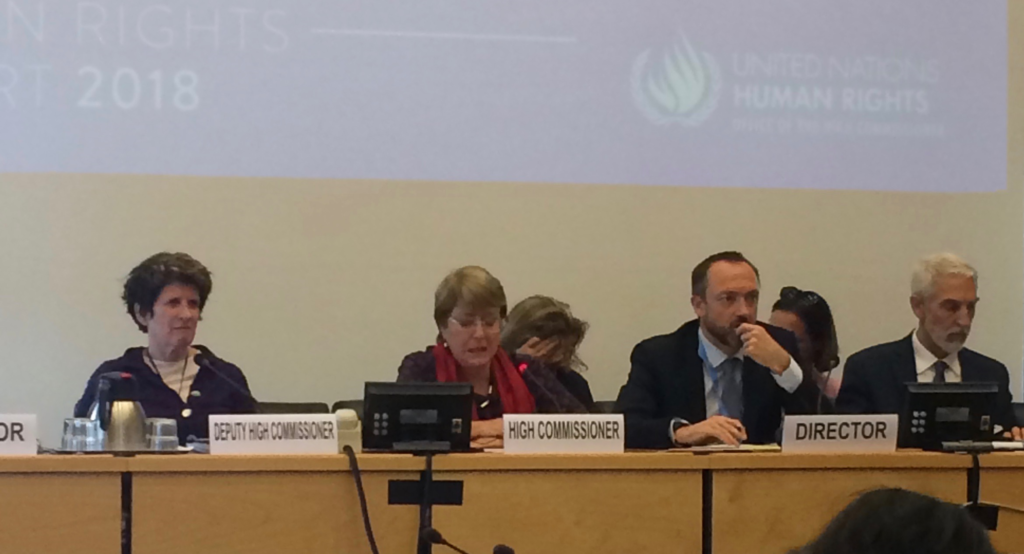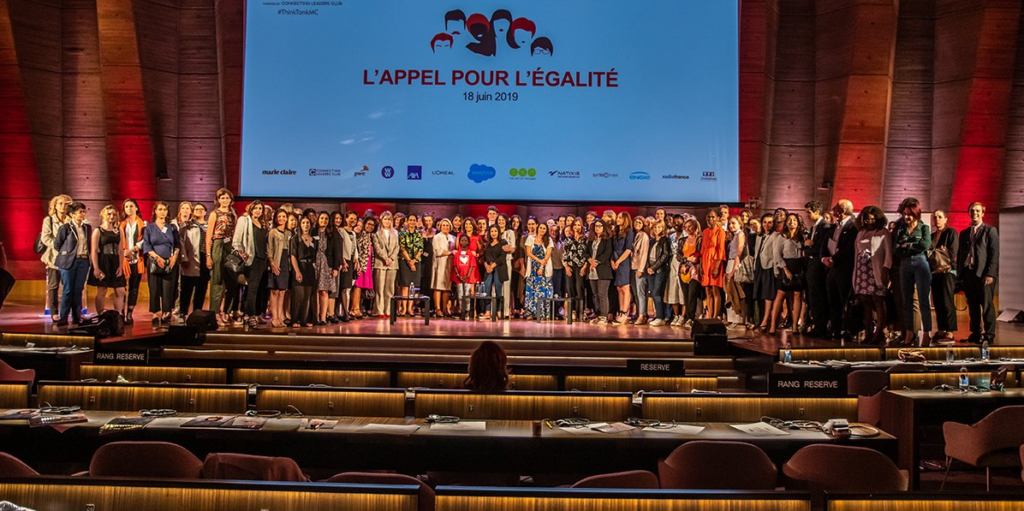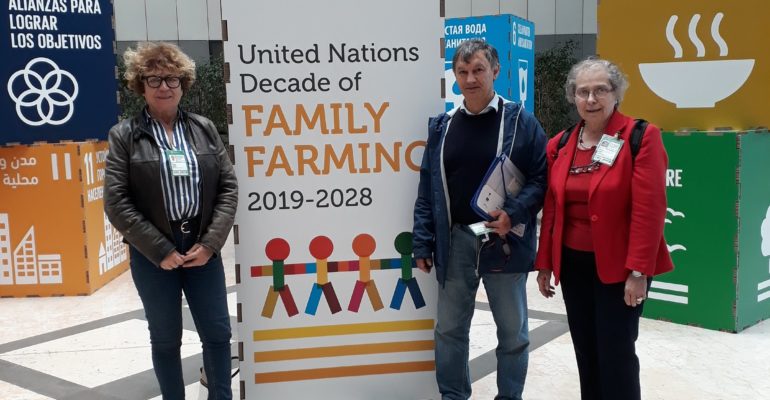This month’s edition contains articles from Soroptimist International’s United Nations Representatives in Rome, Geneva and Paris, and discusses the role of family farming in reaching the UN’s Sustainable Development Goals, the presentation of the latest UN Human Rights Report, and news from the think tank ‘Action for Equality’ held at the United Nations Education, Science and Cultural Organisation (UNESCO) building, in Paris.
SI UN Representative, Liliana Mosca, reports from the Global Launch for the Food and Agriculture Organisation (FAO) and International Fund for Agricultural Development (IFAD) Decade for Family Farming, Rome.
The FAO and IFAD have initiated the United Nations Decade for Family Farming (UNDFF) and Global Action Plan to strengthen support for family farmers, especially in developing countries. Family farmers represent over 90 percent of all world farms and produce about 80 percent – in terms of value – of the food consumed in the world. More than 90 percent of the 570 million farms worldwide are managed by an individual or a single family and rely primarily on family labour. They are, therefore, fundamental actors for agricultural development and for the achievement of the second Sustainable Development Goal (SDG): ending hunger and all forms of malnutrition.
The Decade for Family Farming aims to create a favourable environment for strengthening the role of family farming and maximising the contribution of farmers to food security and global nutrition, as well as a healthy, resilient and sustainable future. The Global Action Plan sets out to provide a detailed guidance for the international community, including: local and national governments, parliamentarians, specialised agencies and other relevant bodies of the United Nations, international financial institutions and other international mechanisms, regional bodies, farmers and producer organisations, academic and research institutes, civil society organisations, and small and medium enterprises and the private sector, to achieve the main objectives of the UNDFF outlined in the vision statement.
The problem of hunger and obesity.

SDG 2: Zero Hunger
“We not only have the problem of hunger – which continues to grow – but also that of obesity, which is also growing and we must pay attention to it. We know what to do to fight hunger, but we do not know enough about how to deal with obesity. Family farmers produce local, fresh food and do it sustainably. This is their contribution” – the Director General of FAO at the inauguration of the Decade on Family Farming. President of IFAD, Gilbert F. Houngbo explained that “in order to achieve the Zero Hunger Sustainable Development Goals and poverty eradication, we must invest in small farmers at the family level and help them to fully exploit their assets, knowledge and energy, and give them the strength to transform their lives and their communities … The choices we make now will determine whether our future food systems will be healthy, nutritious, inclusive, resilient, sustainable or not.”
The paradox:
The Global Action Plan for the Decade of Family Farming highlights a paradox: although family farmers produce most of their food, they are often poor, especially in developing countries. They struggle because they do not have access to the resources and services necessary to support the production and sale of their products; because the infrastructures are poor; because their voices are unheard of in political trials; and because the environment and climatic conditions they depend on are threatened. Generally, women faced greater difficulties, while young people from rural communities are often vulnerable due to the lack of incentives for job opportunities in the fields or in related industries.
The Global Action Plan as a guide to development:
The Global Action Plan of the UN Decade of Family Farming 2019-2028 aims at accelerating 7 Pillars of Action, undertaken in a collective, coherent and comprehensive manner to support family farmers, who are key agents of sustainable development. The specific activities address a spectrum of actors – governments, UN agencies, international financial institutions, regional bodies, farmers and producers organisations, universities, research centres, civil society organisations and the private sector, including large and small companies:
Pillar 1 Develop an enabling policy environment to strengthen family farming.
Pillar 2 Support youth and ensure the generational sustainability of family farming.
Pillar 3 Promote gender equity in family farming and the leadership role of rural women. In particular the goal is to facilitate women’s access to productive assets, natural resources, information, education, markets, and their involvement in the policy formulation processes.
Pillar 4 Strengthen family farmers’ organisations and their capacities to generate knowledge, represent farmers’ concerns and provide inclusive services in rural areas.
Pillar 5 Improve socio-economic inclusion, resilience and well-being of family farmers, rural households and communities.
Pillar 6 Promote sustainability of family farming for climate-resilient food systems.
Pillar 7 Strengthen the multidimensionality of family farming to promote social innovations contributing to territorial development and food systems that safeguard biodiversity, the environment and culture.
Family farming is of central importance in world food security today and for future generations. Public policies that recognise the diversity and complexity of the challenges faced by family farms are key to end hunger and achieve inclusive and efficient agricultural and food systems.
SI UN Representatives, Berthe De Vos and Kristing Reynisdottir reflect on their time at the Presentation of the UN Human Rights Report held in Geneva, 14 June.

UN High Commissioner for Human Rights, Michelle Bachelet, presenting the UN Human Rights Report 2018
The UN Human Rights Report 2018 is the Office of the High Commissioner for Human Rights’ (OHCHR) latest yearly report on its human rights work around the world. The 2018 report is the first report of Ms. Bachelet as High Commissioner, a report that was also marked by the 70th anniversary of the Universal Declaration of Human Rights. The High Commissioner was present with her deputy, directors, Chiefs of Branch and a Chief of Section. The presentation was aimed towards NGO’s with a consultative status; about 100 representatives from all kind of NGO’s from different countries were present.
Today we live in an era of great turbulence; a climate led by hostility and encapsulated by human rights suppression around the world. In it, flourishes the ambition to triumph and to realise the “Human Rights for All”, along with it, its 2030 Agenda. In her speech, Ms. Bachelet questioned the impact of human rights in our contemporary world. By this, she means the challenges that arise through nationalism and populism, rising inequality, resentment and hatred. We see this come to life through the increased suffering of people in areas of political conflict, discrimination towards the selective areas of the population (older persons, people with disabilities, different cultures and heritages).
With a new office, comes a new approach! And with it, a management plan (4 years), that introduces a new form of reporting; one that aims to demystify problems and improve transparency. In its content, the focus will remain on human rights plans towards youth, women, the elderly and the disabled population. As we know, signing and ratifying policies at national or international level is not sufficient, because it does not necessarily lead to implementation. Advocacy is our strongest voice and most important tool. We need people’s help to influence politicians and reach the affected populations/areas. Bringing all kinds of problems into the open and using the media will help to bring awareness of the needs that exist within our world. Even more importantly, we aim to react and shed light to early signs of human rights neglect, so that the right people in national governments have the ability to act fast. We know that once human rights actions are put in place, they can be maintained. Putting more justice and equality into place, will give more security, development and sustainable peace. The “Human Rights for All” ambition is the script that will pave the way to this peace.
However, one of the OHCHR’s biggest constraints is budget funding. Up to now the budget allowed OHCHR to cover the travel expenses of the experts, who are sent to critical area’s to investigate human rights offences. Ms. Bachelet intends to work more with the NGO volunteers on the ground to acquire necessary information. Having the NGO’s report to the experts instead of going directly to the local governments will change the dynamics of the approach. Governments are more willing to accept the visits of the experts of the human rights council in an attempt to avoid hearing negative accounts from the NGO’s. Governments want to show their effectiveness and success in the field. This is why OHCHR’s work with NGO’s remains so vital. The financial, as well as human resource that goes into providing the insight into early alert signs is pivotal. Only by working together can we succeed. And with a right strategy and ambition in place, we can focus on achieving sustainable solutions one step at a time by 2030.
SI UN Representative, Evelyne Para, reports from the Think Tank on Gender Equality, held at UNESCO Paris.

L’appel Pour Egalite/The Call For Equality, UNESCO Think Tank, Paris 2019.
As part of the preparation of the International Forum on Inequalities, which will take place in September 2019 in Paris, I followed the reflections led by the “Action for Equality” Think Tank organised at UNESCO.
How to achieve equality at work?
In almost all countries, women’s incomes and their presence in positions of responsibility remain lower than those of men. Women often hold less economically valued occupations. During the debates of this Think Tank, there was much talk of quotas, networks, commitment of leaders and human resources managers, mixed recruiters …, but also maternity leave. Women consider that their maternity has slowed down their careers, and they think that parental leave should receive a higher allowance to encourage fathers to take it. It was agreed that education is important. Participants asked “do we raise our daughters as our sons? How should we protect them from prejudices and stereotypes that devalue women? What role do teachers have to hold, also the media, to educate about equality? How to teach an equality of dreams and ambitions?” There were so many questions that lead to a very animated debate. The impact of the Global Sustainable Development Goals (SDGs), and in particular SDG 4 (“For quality education”), and the worldwide realisation of the many associated targets, were highlighted. Although attitudes are beginning to change, practices are still not evolving sufficiently: the vast majority of families fail to break free from traditional patterns, and social inequalities fortify gender inequalities.
Women and tech
While both women and men have a good view of New Information and Communication Technologies (NICT) branch, all studies show that too many women would be afraid of not having the necessary skills to code. The importance of role models for girls was emphasised, to encourage them to engage in careers they did not think were within their reach. It is useful to develop professional sorority, and to give more women, who have succeeded in the field of new technologies, the opportunity to testify by explaining their background and their studies in schools. In the field of Artificial Intelligence, it is worrying that there are few women. One of the speakers also said that this “is urgent to change because the robots look like those who create them, but if it is only young men, this will be a problem” as gender bias will be exacerbated.
Women and health
Today in Europe, women die more often of a heart attack than men because their symptoms differ, leading to delayed diagnosis or medical attention. Due to gaps in research, women also experience undesirable side effects of drugs as the medicines have been restricted to testing primarily on male volunteers. So much so that women can be called “unknown continent” in medical research. So do we need to develop health institutes only dedicated for women? Debate arose around whether this would lead to equality or discrimination.
Access to healthcare is sometimes difficult for women. This is the case of isolated women, mothers of single-parent families, and also women in precarious situations. They consider it a luxury to take care of their own health, sometimes depriving themselves of hygiene products, such as toothbrushes, toothpaste, soap, sanitary towel. these restrictions obviously have serious consequences on self-esteem but also on social inclusion. Often women also give up seeking treatment, this was recently announced in a report of the High Council for Equality (HCE): “Their own health does not exist in their eyes. They have only to hold on… their daily life is a permanent race, in which their health passes last, after their children, their companion and the management of their financial difficulties “. So, why this exclusion? Very clearly, the lack of money leads to the renunciation of care. But not only. Poverty also prevents proper nutrition, access to housing or sports activities. Cultural and symbolic barriers also push women in precarious situations out of the health care system.
Following the Think Tank, an official report is prepared which will surely serve as inspiration for the speakers of the next International Forum on Inequality, to be organised at UNESCO in September 2019.
Feature image: Liliana Mosca in attendance at Global Launch for the Food and Agriculture Organisation (FAO) and International Fund for Agricultural Development (IFAD) Decade for Family Farming, Rome.

